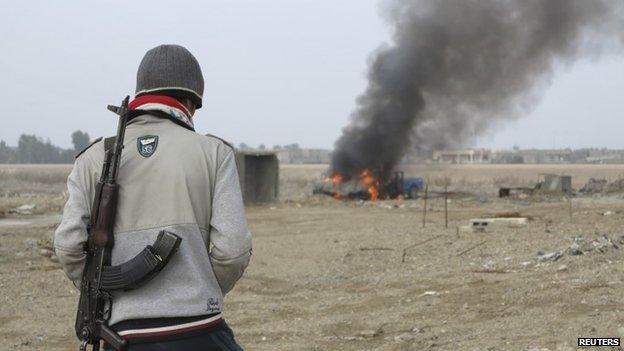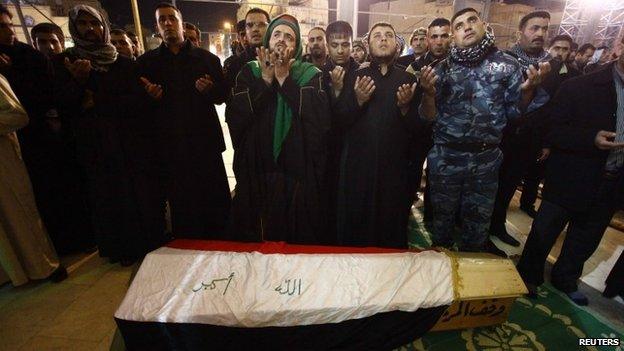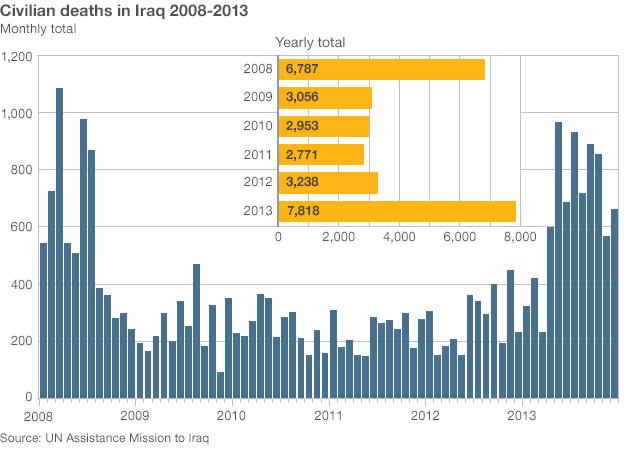Iraq militants 'still control parts of western cities'
- Published

Militants took to the streets after the army pulled out of cities in Anbar
Sunni militants linked to al-Qaeda are reportedly still in control of parts of two cities in western Iraq.
Fierce fighting continues as government troops try to force militants aligned to the Islamic State of Iraq and the Levant (Isis) from Ramadi and Fallujah.
A leader of a tribal militia fighting alongside government forces says that more than 60 jihadists have been killed in or near Ramadi.
Clashes erupted on Monday after troops dismantled a protest camp in the city.
Local Sunni Arabs had been demonstrating for months against what they perceive as discrimination by the Shia-led government and unfair targeting of their minority community by anti-terrorism measures implemented to stem the surge in sectarian violence.
But Prime Minister Nouri Maliki ordered that the sit-in be cleared, alleging it had "turned into a headquarters for the leadership of al-Qaeda".
Meanwhile the conflict appeared to be having an effect on the flow of Iraqi refugees into Jordan.
The UNHCR, the UN refugee agency, said registration had increased fivefold since the beginning of December, though most new refugees came from minority communities in Baghdad.
Smaller numbers were coming from Anbar province, where the fighting was taking place, and from the majority Shia community, the UN said.
An average of 415 Iraqi refugees a week are now entering Jordan, compared with 500 Syrians per day, it added.
'Peaceful takeover'
On Tuesday, Mr Maliki agreed to withdraw the army from towns and cities in Anbar so that the police could resume control of security.
But as soon as soldiers left their posts, militants aligned to al-Qaeda appeared on the streets of Ramadi, Fallujah and Tarmiya, storming police stations, freeing prisoners and seizing weapons.
The prime minister reversed his decision the next day, sending soldiers back to Anbar and offering tribal leaders weapons and money in return for helping combat the militants.
On Thursday, police and pro-government tribesmen battled Isis and its allies for control of Ramadi and Fallujah. Hospitals reported that at least 35 people were killed and 70 wounded.
Militants raised black flags on buildings in both cities and used the loudspeakers of mosques to call on people to join their struggle and support a "peaceful takeover".

Hospitals reported that at least 35 people were killed in the clashes in Anbar on Thursday
On Friday, a police officer told AFP news agency that fighters from Isis had advanced into new areas of Ramadi after early morning clashes in the city centre and deployed snipers on one street.
But Sheikh Ahmed Abu Risha, a leader of the Sahwa tribal militia which is helping government forces, said 46 Isis members had been killed in Ramadi and another 16 in the town of Khaldiyah to the east.
There were conflicting reports about the fighting in Fallujah. One policeman told AFP that while about a quarter of the city remained under the control of the militants, the army had re-entered several areas. However, a colleague said the army had yet to enter the city.
There has been a surge in sectarian violence in Iraq since April, when there was a deadly crackdown on a Sunni protest camp in Hawija.
Extremist Sunni militants subsequently stepped up attacks across the country, while Shia groups began deadly reprisals.
On Wednesday, the United Nations said at least 7,818 civilians and 1,050 members of the security forces had been killed in 2013.
The annual death toll was the highest in years, but still significantly below those recoded at the height of the insurgency in 2006 and 2007.
